16+ Sample Job Order Contracts
-
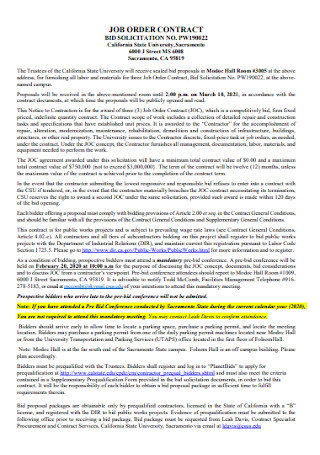
Sample Job Order Contract
download now -
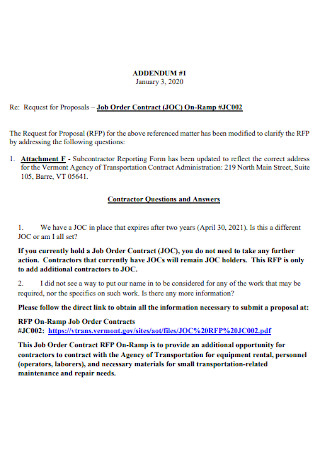
Job Order Contract Format
download now -
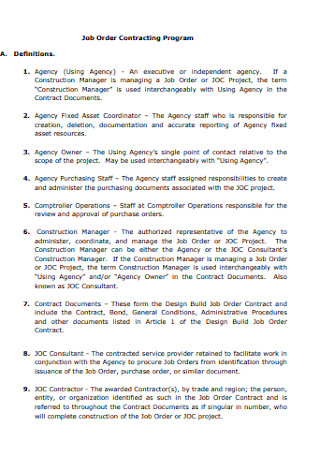
Job Order Contracting Program Template
download now -
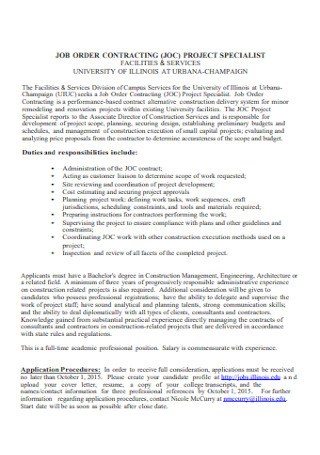
Project Job Order Contract
download now -
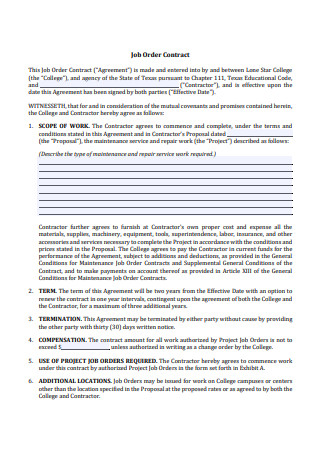
Basic Job Order Contract
download now -
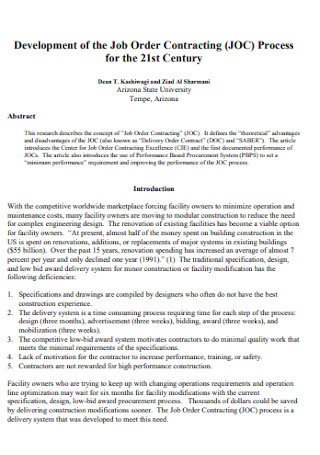
Development of the Job Order Contract
download now -
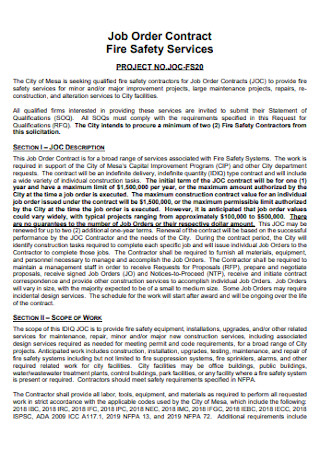
Fire Safety Job Order Contract
download now -
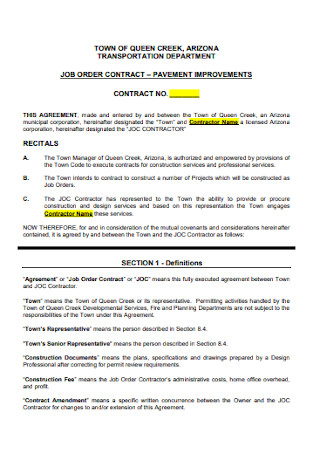
Transportation Job Order Contract
download now -
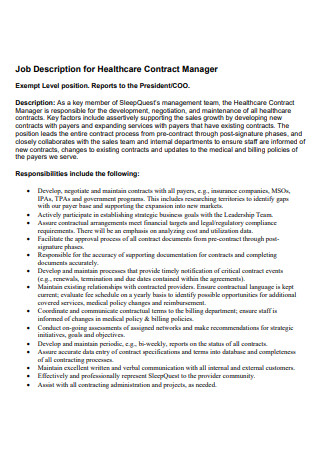
Job Order Healthcare Contract
download now -
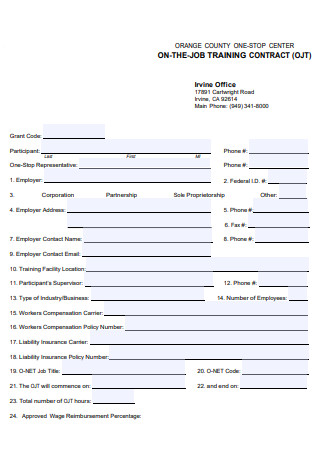
Job Order Training Contract
download now -
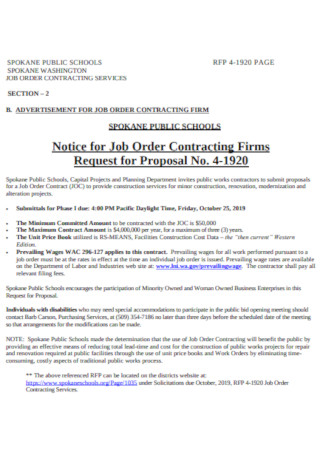
Job Order Contract Proposal
download now -
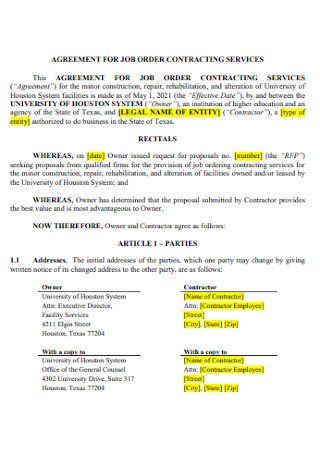
Agreement for Job Order Contract
download now -
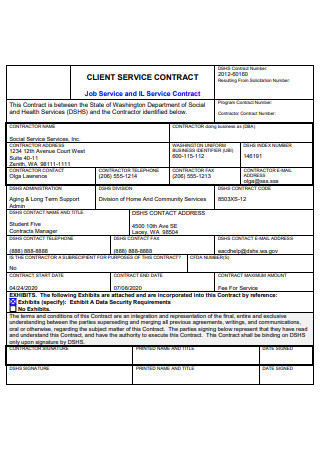
Client Job Order Contract
download now -
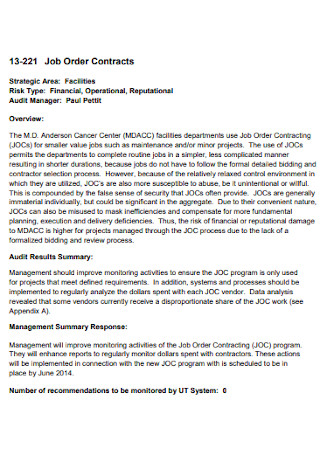
Simple Job Order Contract
download now -
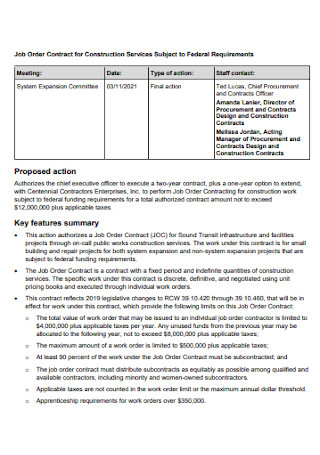
Job Order Contract for Construction
download now -
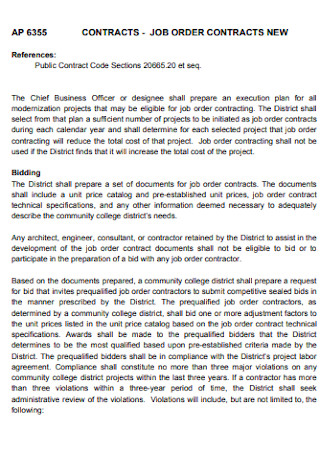
New Job Order Contract
download now -
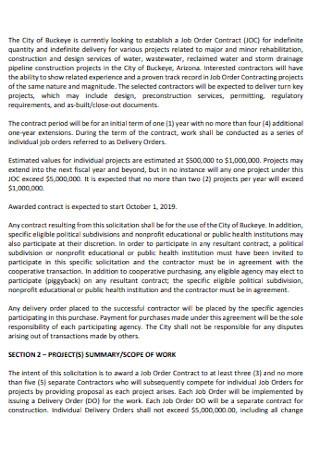
Job Order Contract for Water Pipeline
download now
What Is a Job Order?
Job order refers to a verbal or written notice from an employer to a personnel agency that a work vacancy exists for which the employer seeks a candidate and includes all job-related details. This year, more than 4 million individuals have abandoned their work employment each month in the United States. According to a new study, this record-breaking trend will continue for the foreseeable future. According to a report by McKinsey & Co., over forty percent of employees are contemplating leaving their current positions within the next three to six months.
Benefits of Work
It is no secret that many individuals dislike their work. For some, it is due to their supervisor or coworkers. For others, it’s due to a lack of perceived work-life balance. Many believe that having a job is tantamount to surrendering one’s soul to large, evil corporations. It’s as if rebelliously disliking employment or conforming to capitalism makes one appear more relaxed and superior. While everyone seems to be attempting to avoid having a regular full-time job, there are numerous advantages to working a 9-to-5 job that may convince you otherwise. Let’s examine many of them:
Tips to Improve Work Performance
By failing to detect and enhance job performance, you may experience challenges such as a decline in work quality, communication, and professional development. Whether you are entering the workforce for the first time, seeking a promotion, or attempting a career change, learning to develop professionally continuously should be an inspiring and challenging standard practice. Please do not wait until your annual performance review or, even worse, when your supervisor brings it up. Here are some strategies for improving your work performance and being the best version of yourself.
1. Set milestones.
We have a natural propensity for setting ambitious objectives. It is acceptable to be audacious while creating goals to enhance work performance. Problematically, large projects can be overwhelming. Whether personal or professional, setting milestones can aid in achieving ambitious objectives. By breaking down significant personal and professional purposes into smaller goals, you will remain motivated as you accomplish each success. Setting individual success measures to evaluate your plan is also an excellent way to enhance your motivation and energy. Track your progress, revel in your accomplishments, and share them with your colleagues.
2. Plan, organize, and prioritize.
Planning your daily plan and arranging and prioritizing tasks or objectives is crucial for enhancing your work performance. When creating your to-do list, be realistic and attainable. It is preferable to set reasonable goals and exceed them than to do the opposite. Creating a clear plan in advance is also highly helpful for determining which chores may be postponed in favor of more important, urgent tasks and which jobs can be delegated without impacting the outcome. After planning, arrange your work by dividing large projects into smaller tasks and assigning each one a due date and priority level. Then, prioritize your work by combining the most urgent and essential activities, and assess the time required to complete each. To prioritize projects and manage your to-do list successfully, you must understand how to delegate and decline assignments that could impede your progress.
3. Stay focused and avoid distractions.
Today’s workers are witnessing a rise in distractions and interruptions and a decline in quiet concentration time, resulting in an increase in overtime work with little to show for it. The most productive workers in the world have identified distractions as the number one adversary of productivity. Always focus on your objectives. Remember the stakes whenever you are tempted to check your Facebook feed or watch your favorite YouTube channels. Concentrate on taking one step at a time and finishing one task before beginning another. This article explains in detail how to avoid workplace distractions.
4. Learn to manage interruptions.
Do you realize how often you get interrupted each day? Various studies suggest that workers are interrupted every six to twelve minutes. There are numerous types of interruptions, and avoiding them is crucial for enhancing work efficiency. Whether it’s a conversation or a member of your family knocking on the door of your home office, repeated interruptions can cause you to lose concentration and waste time you previously allotted to a task, increasing the likelihood of missing a deadline.
5. Avoid multitasking.
Most people claim to be specialists at multitasking, but in reality, multitasking degrades the quality of their work. Although multitasking may increase productivity, it has the opposite effect. When you begin working on multiple tasks, please take a moment to assess the most important one and then devote your full attention to it. Working on one activity makes you more productive, less agitated, and less likely to commit errors.
6. Don’t leave things half-done.
This is almost certainly the result of attempting to multitask. Consider how many New Year’s resolutions, diets, new sports, or hobbies you’ve started, only to abandon them shortly after. They are great for a short time but reappear on your to-do list. Do not allow this to occur. Once you begin a task, you should strive to complete it. Motivate yourself by keeping track of every finished project.
How to Find a New Job
Finding a new job can be easy and frustrating if you are one of the fortunate few with a high-demand profession. You can make the job hunt easier on yourself if you utilize proactive techniques for finding a new job. The suggestions for finding a new position in this article apply to all job seekers, from those just starting to those with extensive experience who need a refresher. Here are some top recommendations for finding a new job at whatever level of your career.
1. Get clear on what you want
Before beginning your job hunt, consider your talents and shortcomings, as well as the type of work you prefer doing. The higher your self-awareness, the more probable you will discover a new career that gives you greater satisfaction. What do you seek in a job? What is more critical: a title, salary increase, advancement, the nature of the work, the location, or the corporate culture?
2. Research your prospective employers
Once you have determined what you want, you must choose what the companies you are applying to want. Investigating a company’s Glassdoor page helps find a new job. It will help you acquire a feel for the company’s culture, learn what
3. Tailor your resume to each job
Your resume is one of the essential tools in the job search process. One of my best tips for finding new employment is to have a resume that highlights your accomplishments and includes quantifiable achievements relevant to the place you’re applying for. Make yourself a perfect match. Examine the terms and phrases used in the job description. Ensure that they are included in your resume. Customize your resume for each position; the recruiter should be able to tell within a few seconds that you possess the desired skills.
4. Create your online career brand
Building your brand is as simple as showcasing your expertise and passion online, where prospective employers can find you. Most recruiters, including myself, use LinkedIn as their primary search tool; if you’re a professional, you should maximize your use of LinkedIn. It is an excellent resource for locating individuals employed by companies of interest and positioning yourself to be discovered by recruiters and hiring managers with relevant openings.
5. Get organized
Before you begin applying for jobs or interviewing with employers, take a moment to organize your job search with a system that works for you. A simple tracking spreadsheet works best to keep track of the jobs you’ve applied for, the interview invitations you’ve received, etc.
FAQs
What makes a good worker?
Being courteous, articulate, composed, and presentable at work are all components of professionalism. Integrity and honesty A good employee tells the truth about sensitive topics, such as workload, work-life balance, demanding customers or coworkers, and ineffective procedures. Creative concepts.
What is important in a job?
Not surprisingly, this item continues to be one of the most essential for workers. Workers who are not permitted to use their strengths seek employment where they can; they frequently seek work where they can use them even more.
How can you get noticed at work?
While accepting new tasks and duties might help you stand out on the job, it is also crucial to establish appropriate boundaries for yourself. Understand your work limitations and only accept projects you are confident you can complete on time.
It would help if you continued to employ conventional means to obtain a job; you never know when an option will present itself. The purpose of this post is to encourage you to think more deeply and broadly about your job search. There is no harm in sending your information to job sites with specifications about the positions you seek. Sign the job order contract if required if you already have a job.
